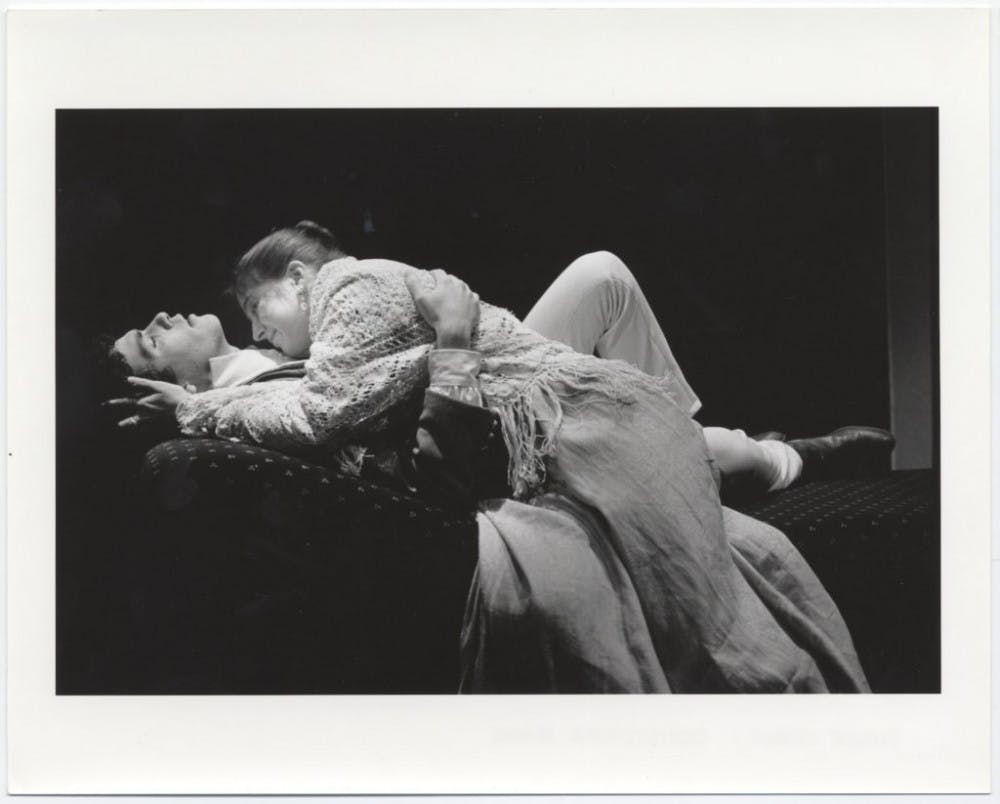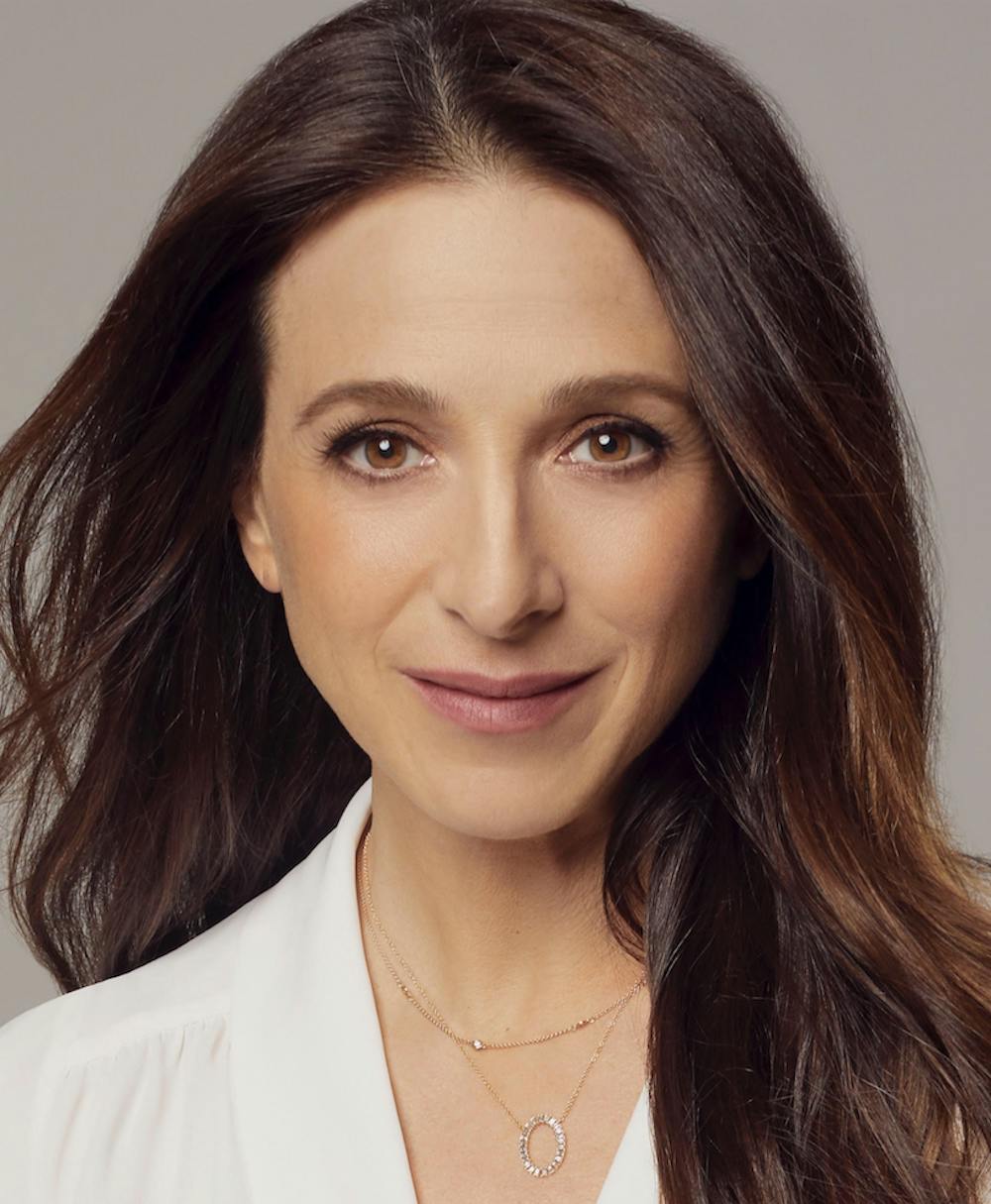“I’m going to Paris.”
Rose Weissman, mother of housewife turned stand-up comedian Miriam “Midge” Maisel, declares her intention to move to the City of Light in the first episode of the second season of Amazon’s “The Marvelous Mrs. Maisel.”
“I don’t feel like I have a life here anymore,” Rose says through polished magenta lips. Her husband, Abe, barely looks up from his newspaper as she details her misery in their shared life in New York City.
“So, I booked myself a flight for tomorrow night.”
Marin Hinkle ’88 was on a bicycle in Martha’s Vineyard when she received a call from her agent telling her that she had been nominated for the Emmy for Outstanding Supporting Actress in a Comedy Series for her portrayal of Rose.
The call came as an unexpected, pleasant surprise. “It was such an incredibly lovely thing,” Hinkle said. “For me, the dream was ‘please, can I keep working and have some degree of connection to the storytelling?’ as I get older,” she added. Ageism in Hollywood made her so grateful for any work that she had never imagined the possibility of accolades.
“I feel very appreciative, more so than I probably would’ve felt in my twenties.”
“The Marvelous Mrs. Maisel” has received a total of 34 Emmy nominations over two seasons and won eight Emmys in 2018, including the award for Outstanding Comedy Series. “What’s so meaningful about this is one doesn’t know, as an artist, why something is ever going to be something people are interested in. If it happens, you feel so lucky that it has some degree of potency or relevance,” Hinkle said.
The candy-colored version of the 1950s portrayed in “The Marvelous Mrs. Maisel” — embellished with coordinated coats and hats, bright lipsticks and pastel furniture — seems to have achieved that goal of potency and relevancy. The New York Times reported that the first episode of Season 2 had an average audience of 3.3 million viewers during its first week on Amazon. Midge Maisel’s world and the show’s quick-witted dialogue are the brain child of Amy Sherman Palladino, creator of the ultra-popular “Gilmore Girls” and lesser-known “Bunheads,” and her husband Daniel Palladino. The Palladinos, Hinkle said, have created a period show that appeals to a wide audience — one that can include Hinkle’s sixteen-year-old son and her mother.
“Amy Sherman Palladino contemporizes the dialogue in a way that it doesn’t feel creaky at all. But, I love that we can bring people of this generation into something from their grandparent’s lives,” Hinkle said.
Prior to Season 1’s release, The New York Times called the show “A superhero story,” noting that Midge’s goal “is not to save the world but to find a place in it: to stand up for herself by doing standup for herself.” In Season 2, Rose is allowed her own story of self-discovery — alongside her daughter.
“With Rose, I felt like she was there as more support for her extraordinary child’s journey,” Hinkle said of her character in Season 1. “Suddenly, when they handed me a script where the character had this light shining on who she was, it felt so unbelievable.” She found that Rose’s quest for self-discovery mirrored her own questioning as an actor. “I was like, what do you mean I have to figure myself out?”
When Rose departs for Paris, she doesn’t ask for permission — leaving Abe and Midge in disbelief and panic when they realize she is already gone. The observant viewer, however, is less surprised. Unlike Midge’s stage-ready comedy, Rose’s personality and wit have emerged slowly throughout the first season’s eight episodes: revealed in the theatrical, tearful outburst that follows Midge’s announcement of her separation from her husband, in her emotional rants to her favorite fortune teller and in the force with which she whacks a walnut when her perfect dinner plans disintegrate. Her wants for more come in small asides, often inside recollections of her time studying in Paris in her youth.
Season 2, then, begins Rose’s second act. Her Parisian life is simple: she adopts a scruffy dog, naming it Simone, and resides in an apartment adorned with minimal furniture and equipped with only a communal bathroom.
Through the costumes, makeup and decor of Rose’s new life in Paris, as well as the pieces of her old self which remain in her Upper West Side apartment, “the character comes to life in a way that is so much richer than anything I’ve gotten to work on before,” Hinkle said. The opening episode, “Simone,” named for the dog, is Hinkle’s Emmy submission — the episode used to nominate her for the award.
By the end of the season’s second episode, Rose has returned to New York, leaving Simone with her Parisian landlady. But the dog’s departure is not the end of Rose’s self-defining journey. Back in New York, Rose takes art classes, challenging the gender dynamics of Columbia’s Art Department. She begins forging her own narrative, her life no longer serving primarily as material for her daughter’s stand-up. “I think there was kind of this feminist liberation — so that she sort of threw her hat off, the way that Midge did,” Hinkle said.
When she was a college student, Hinkle struggled to feel that same sense of liberation. “I think I was quiet. And if I were to ever go back and re-do my college, I would try to find more courage.”
But she still pushed herself. In her first year, Hinkle auditioned for about 16 plays before she ever received a callback. She dealt with rejection by letting herself absorb and learn from the people around her instead.
[caption id="" align="aligncenter" width="650"]

Outside of class, Hinkle reveled in the collaborative energy of the Production Workshop and Sock and Buskin, finding her way into the theater community at Brown. “I was that kind of epitome of a Brown student who was starving for information, and it was such a great place to take in like a whole range of things.”
Now, Hinkle finds herself looking to her castmates for courage, which she sees in Rachel Brosnahan, who plays Midge, and Alex Bornstein, who plays Midge’s manager, Susie. “They are unapologetic, and they are fighters in ways that are inspirational to me.”
In 1986, Hinkle appeared in a Sock and Buskin production of “Childe Byron,” alongside then University senior, now three-time Academy-Award nominated actress Laura Linney ’86. Linney is also nominated for an Emmy this year, for Outstanding Lead Actress in a Drama Series for “Ozark.” At Brown, Linney — two years older than Hinkle — shared lunches and advice with her younger friend.
“She’s extraordinary. … If I get to see her on the red carpet, I’m going to lose it,” Hinkle said.
“The Marvelous Mrs. Maisel” won six awards at the Creative Arts Emmys last weekend, with 7 nominations left for the Primetime Awards this Sunday. There, Hinkle will join many other Brown alums nominated in various categories, including Aunjanue Ellis ’92, nominated for Outstanding Lead Actress in a Limited Series or Movie for her role on “When They See Us,” and Steven Levenson ’06, nominated for Outstanding Writing for a Limited Series for “Fosse/Verdon.”
While each of these performers and artists took different paths after they left the University, they may all meet again in some way or another this Sunday.
“I give so much credit to (Brown), that you’re allowed to be very different in your path and that nobody has to have a path like anybody else,” Hinkle said.





